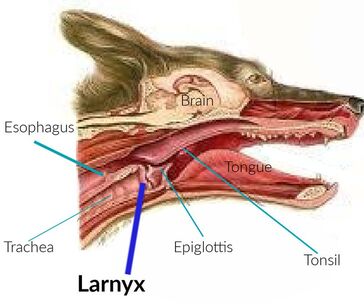Laryngeal Paralysis
|
Laryngeal Paralysis is a life-threatening condition that hampers an affected dog's ability to breathe, leading to suffocation. First, let's review some anatomy: The larynx is the medical name for the "voice box". The larynx's job is to protect the airway- it opens up when a breath is taken, then closes after the breath is exhaled or food/water is swallowed. In this way, the larynx allows air in and prevents food/water from entering the lungs. In cases of laryngeal paralysis, the larynx doesn't open leading to the inability to take a deep breath.
|
Laryngeal paralysis is due to abnormal nerve function to the muscles that move laryngeal cartilages and is often an "idiopathic disorder"- meaning that we don't always understand why some pets are affected while others are not. In the beginning, the paralysis usually affects only one side of cartilage and then progresses to both sides of the larynx. Older, large breed dogs are most often affected by this condition: Labrador Retrievers and Golden Retrievers are predisposed. Dogs diagnosed with a thyroid condition ("hypothyroidism") may be more likely to develop laryngeal paralysis. Obesity exacerbates this condition, as does a hot, humid environment.
Symptoms may be subtle, at first, but become progressive:
-decreased willingness to play or exercise
-panting even when not exercising
-occasional cough
-noisy or labored sounding breathing
-changes in the sound of barking (often described as becoming more hoarse)
-collapse
Symptoms may be subtle, at first, but become progressive:
-decreased willingness to play or exercise
-panting even when not exercising
-occasional cough
-noisy or labored sounding breathing
-changes in the sound of barking (often described as becoming more hoarse)
-collapse
|
Laryngeal paralysis is often suspected based off of the pet's medical history and physical exam findings.
Definitive diagnosis involves examining the larynx in motion while the pet is under anesthesia. Bloodwork and chest xrays may also be done to evaluate the respiratory system and the rest of the body. Emergency medical treatment of this condition often involves: -providing supplemental oxygen -keeping the pet as calm as possible (inability to breathe easily causes panic and increased oxygen need) -cooling of body temperature (hard panting increases body temperature) Surgery is the best treatment for laryngeal paralysis. During surgery, the suture material is used to tie one of the laryngeal cartilages open. Possible risks with surgery include: development of aspiration pneumonia (occurs when food, water, or saliva gets into the lungs), coughing, and decreased barking ability. Visit https://www.petmd.com/dog/conditions/respiratory/c_dg_laryngeal_disease for more information. |


